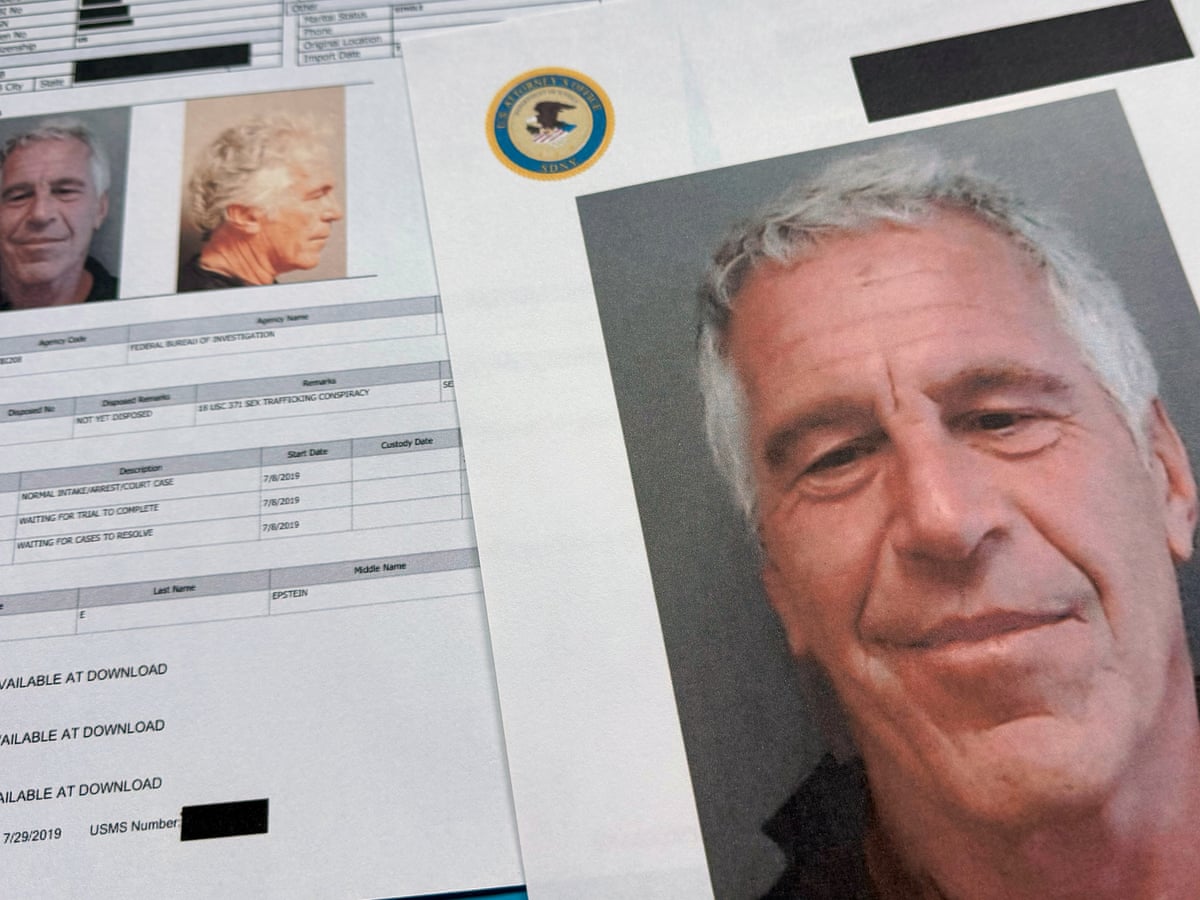
China says it will ‘fight to the end’ after Trump threatens to impose still more tariffs
BEIJING (AP) — China said Tuesday it would “fight to the end” and take countermeasures against the United States to safeguard its own interests after President Donald Trump threatened an additional 50% tariff on Chinese imports.
The Commerce Ministry said the U.S.‘s imposition of “so-called ‘reciprocal tariffs’” on China is “completely groundless and is a typical unilateral bullying practice.”
China, the world’s second-largest economy, has announced retaliatory tariffs and the ministry hinted in its latest statement that more may be coming.
“The countermeasures China has taken are aimed at safeguarding its sovereignty, security and development interests, and maintaining the normal international trade order. They are completely legitimate,” the ministry said.
“The U.S. threat to escalate tariffs on China is a mistake on top of a mistake and once again exposes the blackmailing nature of the U.S. China will never accept this. If the U.S. insists on its own way, China will fight to the end,” it added.
Analysts and traders worry about a global trade war
Trump’s threat Monday of additional tariffs on China raised fresh concerns that his drive to rebalance the global economy could intensify a financially destructive trade war. Stock markets from Tokyo to New York have become more unstable as the tariff war worsens.

Trump’s threat came after China said it would retaliate against U.S. tariffs he announced last week.
“If China does not withdraw its 34% increase above their already long term trading abuses by tomorrow, April 8th, 2025, the United States will impose ADDITIONAL Tariffs on China of 50%, effective April 9th,” Trump wrote on Truth Social. “Additionally, all talks with China concerning their requested meetings with us will be terminated!”
If Trump implements his new tariffs on Chinese products, U.S. tariffs on Chinese goods would reach a combined 104%. The new taxes would be on top of the 20% tariffs announced as punishment for fentanyl trafficking and his separate 34% tariffs announced last week. Not only could that increase prices for American consumers, it could also give China an incentive to flood other countries with cheaper goods and seek deeper relationships with other trading partners, particularly the European Union.
Chinese people worry, but keep faith with their country
On the streets of Beijing, people said they found it hard to keep track of all the announcements, but expressed belief in their country’s ability to weather the storm.
“Trump says one thing today and another tomorrow. Anyway, he just wants benefits, so he can say whatever he wants,” said Wu Qi, 37, who works in construction.
Others were less sanguine. Paul Wang, 30, who sells stainless accessories, including necklaces, bracelets, and tongue studs to Europe, said the European market was now more important after the extra U.S. 50% tariffs and he would be watching to see which other firms in his field would be competing in that space.
Jessi Huang and Yang Aijia, whose companies import chemicals from the U.S., said the tariffs, including potential Chinese retribution, could force them to close up shop.
“It would be very hard and very likely to have a layoff, maybe even closing,” Huang said, “I might not be able to find another job if I get laid off.”
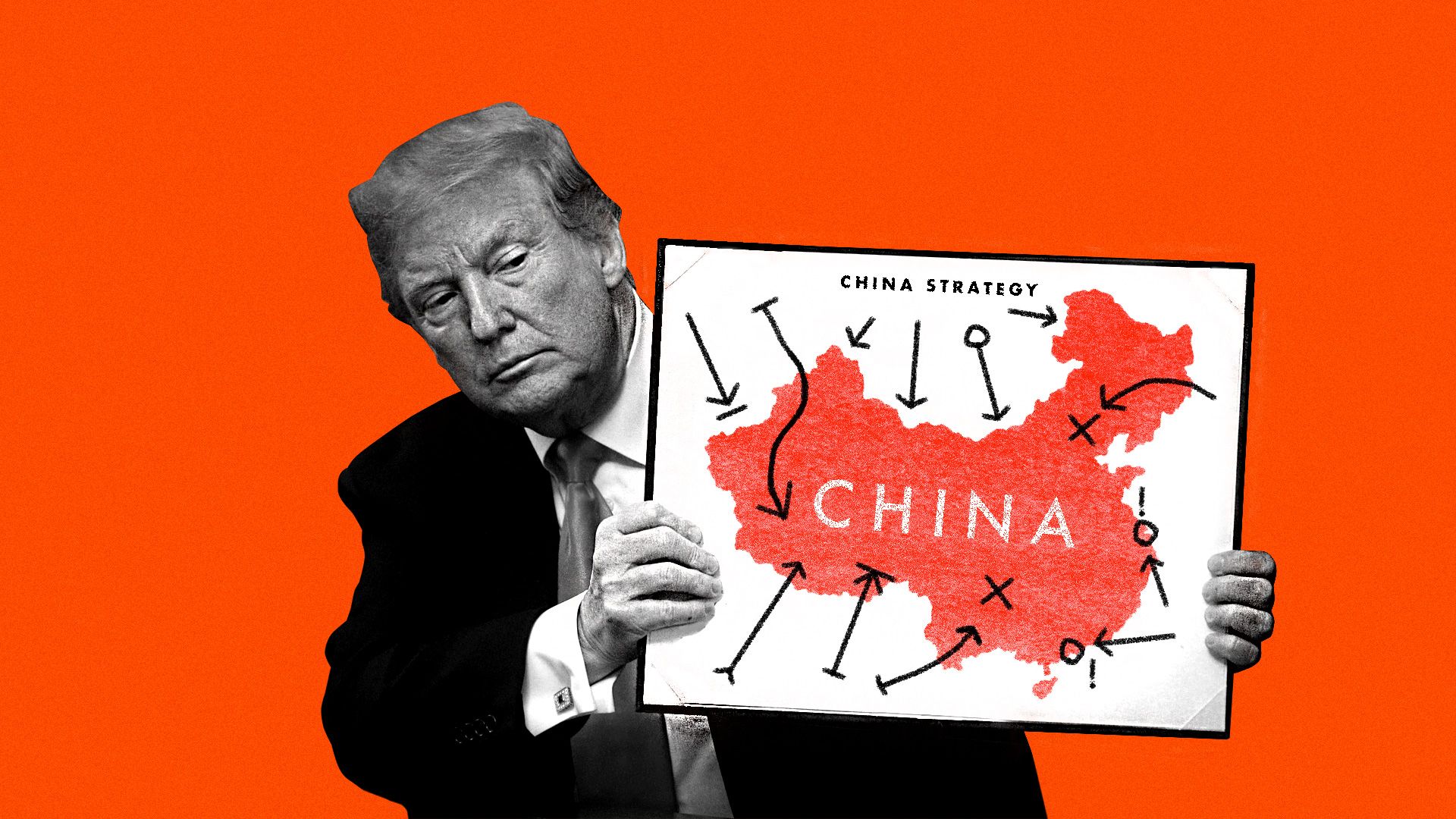
China isn’t out of options to retaliate
China still has a range of options to strike back at the Washington, experts said, including suspending cooperation on combating fentanyl, placing higher quotas on agricultural products and going after the U.S. trade in services in China such as finance and law firms.
U.S. total goods trade with China was an estimated $582 billion in 2024, making it the top trader in goods with the U.S. The 2024 deficit with China in goods and services trade was between $263 billion and $295 billion.
Foreign Ministry spokesperson Lin Jian appeared to give short shrift to talk of dialogue with the Trump administration.
“I don’t think what the U.S. has done reflects a willingness for sincere dialogue. If the U.S. really wants to engage in dialogue, it should adopt an attitude of equality, mutual respect and mutual benefit,” Lin said.
In Hong Kong, where stocks were slightly higher Tuesday, Chief Executive John Lee blasted the latest U.S. tariffs as “bullying,” saying the “ruthless behavior” has damaged global and multilateral trade and brought great risks and uncertainties to the world.
Lee said the city would link its economy closer to China’s development, sign more free trade agreements, attract more foreign companies and capital to Hong Kong, and support local enterprises in coping with the impact of the tariffs.

China calls Trump’s new tariff threat ‘a mistake upon a mistake’ and looks for opportunity in global trade war

While many nations are scrambling to strike tariff deals with Trump, China is standing up to him, hoping to turn “crisis into opportunity.”
Within 48 hours of Trump’s market-hammering announcement of tariffs on countries across the world, the world’s second-largest economy swiftly retaliated with its own punitive measures on US goods and firms.
Then, after the US president vowed to ratchet up tariffs again on Monday, Beijing once again vowed to hold the line. “The US threat to escalate tariffs on China is a mistake on top of a mistake,” its Commerce Ministry said a statement.
The threat “once again exposes the blackmailing nature of the US,” the statement said. “China will never accept it. If the US insists on its own way, China will fight to the end.”
Beijing’s defiance is part of what has appeared to be a carefully calibrated confidence from a Chinese government that’s decided to position itself an oppositional force standing up to what it calls “unilateral bullying” from the US.

Over the weekend, Beijing telegraphed a clear message for its domestic audience and foreign countries: China is well prepared to weather a trade war – and come out stronger on the other side.
“US tariffs will have an impact (on China), but ‘the sky won’t fall,’” a commentary in the ruling Chinese Communist Party’s mouthpiece People’s Daily said Sunday.
“Since the US initiated the (first) trade war in 2017 – no matter how the US fights or presses – we have continued to develop and progress, demonstrating resilience – ‘the more pressure we get, the stronger we become,’” read the commentary, which was also on the front page of the paper’s Monday edition.
With the “strong leadership” of China’s Communist Party and the country’s “institutional advantages,” China was “sure to turn crisis into opportunity and move steadily into the future,” the commentary said.
Trump on Wednesday unveiled an additional 34% tariff on all Chinese goods imported into the US, bringing duties on all Chinese imports to the US to well over 54% when existing tariffs are taken into effect. Beijing hit back Friday with its own baseline 34% tariffs on all American imports, as well as other measures, including export controls on rare earth minerals and trade restrictions on specific US companies.
On Monday, the US president threatened to significantly ratchet up the trade war between the world’s two largest economies by slapping an additional 50% tariffs on Chinese imports midweek if Beijing doesn’t remove its retaliatory tariffs by Tuesday.
The American president also said China’s “requested meetings” with the US would be canceled.
.

Beijing’s rhetoric in response speaks to what could be the strategic calculation of Chinese leader Xi Jinping and his cadres in Beijing: that Trump is not just using the tariffs as a negotiating tactic – and the epic disruption to global trade has the potential to hurt the US more than China.
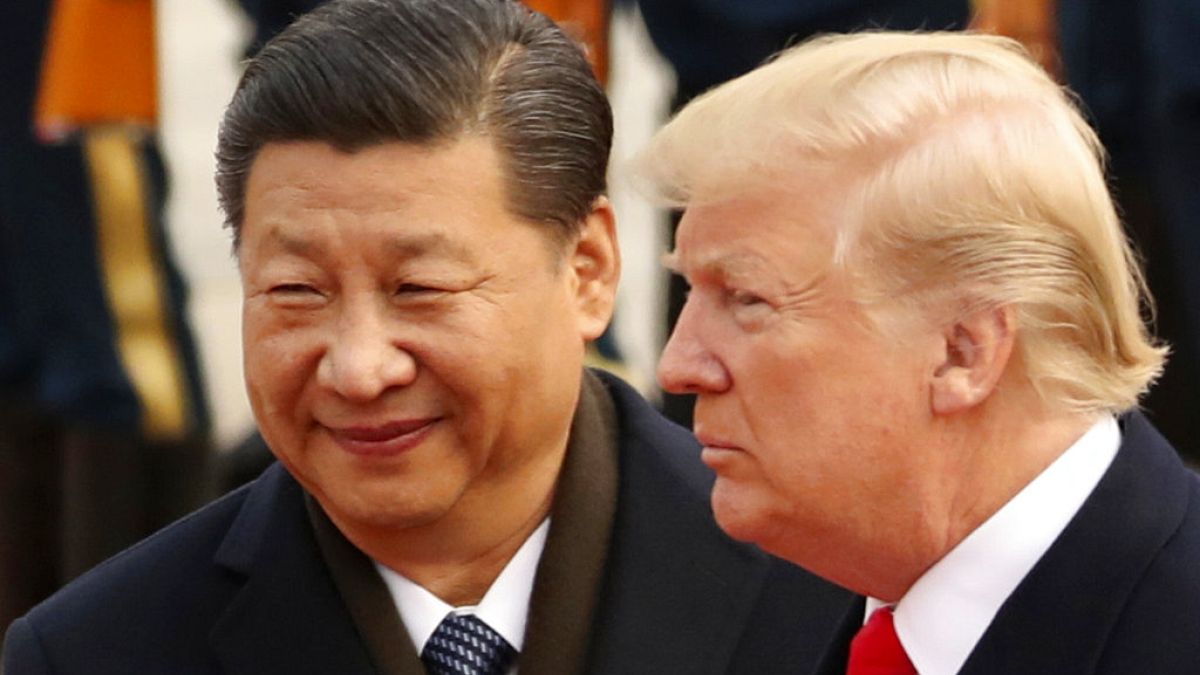
“Many (People’s Republic of China) counterparts have argued (the) US is making a mistake that will undermine its own global standing,” Ryan Hass, a senior fellow at the Washington-based Brookings Institution think tank, wrote on the social media platform X on Sunday, following meetings with government officials, scholars, business leaders during a visit to China.
“There’s debate about whether the world is entering a period of blocs or a transition to an era of globalization minus the US. Beijing seems to prefer the latter scenario,” he said, adding that “China’s leaders will not countenance being seen as passive in response to US.”
‘Ready to compete’
As Trump’s tariffs target friends and foe alike, Chinese officials have already in recent weeks looked to project China as an alternative champion and protector of a globalized economy that’s enhanced the prosperity of countries around the world, as well as a stable economic partner and haven for business.
“As the world’s second-largest economy and the second-largest consumer market, China will only continue to open its doors wider, regardless of the changing international landscape,” China’s Foreign Ministry said in a statement on Saturday.
On Sunday, Ling Ji, a vice minister at China’s Commerce Ministry, hosted representatives from 20 US-funded enterprises including Tesla and GE HealthCare, according to a ministry statement.
Ling touted China as an “ideal, safe, and promising” place for investment, while calling on American businesses to “be rational voices” and “take practical actions” to maintain the stability of global production and supply chains.
Economic experts speaking to Chinese state broadcaster CCTV on Saturday also played into the idea that the trade shake-up was an opportunity for Beijing.
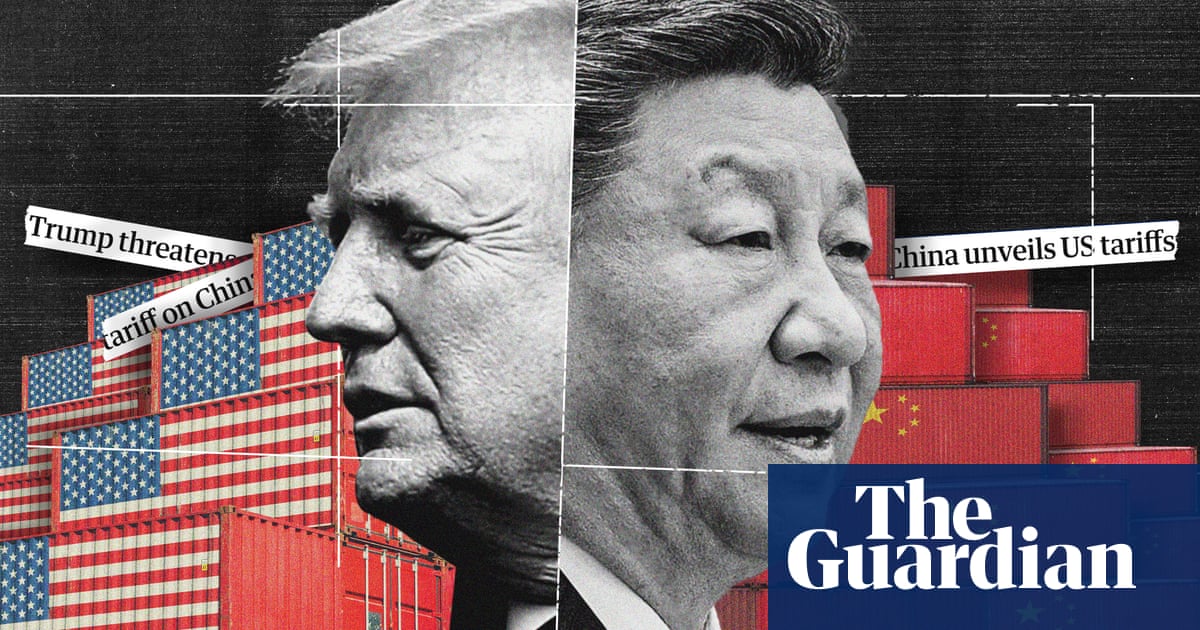
“China is sending a significant message to the world: we cannot back down or tolerate US bullying, as tolerance ultimately leads to more bullying,” said Liu Zhiqin, senior researcher at Chongyang Institute for Finance Studies in Renmin University of China, told the broadcaster.
“China and the US are now direct rivals in reshaping the international trade order,” said another, Ju Jiandong, a professor at the People’s Bank of China School of Finance of Tsinghua University. “We’re willing to take on the challenge – we’re ready to compete with the US in redefining the new global trade system.”
China’s trade partners are likely to take such messaging with a grain of salt.

Beijing is well known to have wielded access to its massive market as a weapon to coerce countries, often over political stances that sparked Beijing’s ire. Many will also be looking warily at whether Chinese exports will flood their own markets, hurting their own domestic production or driving down consumer prices.
But countries may have little choice but to look to strengthen ties with China if US tariffs, which hit American allies as well as rivals, become the new normal.
Beijing over the past month held economic talks with Japan and South Korea, hit last week with 24% and 25% tariffs respectively, as well as with the European Union, which was slapped with 20% duties.
Many Southeast Asian economies – key manufacturing hubs for companies looking to diversify away from China – have been hit particularly hard by Trump’s tariff war. While few want to pick a fight with Washington publicly, the region is rattled.
In Singapore, an ultra-connected free trade bastion known for treading a cautious diplomatic line, Prime Minister Lawrence Wong pulled few punches in a message to his fellow citizens over the weekend.
“The recent ‘Liberation Day’ announcement by the US leaves little room for doubt,” he said. “It marks a seismic change in the global order. The era of rules-based globalization and free trade is over. We are entering a new phase, one that is more arbitrary, protectionist and dangerous.”
Domestic challenges

Andy Wong/AP
China, however, is still bracing for impact – and what could be an extended period of escalation between the two governments and their leaders.
Xi’s defiance risks “locking both leaders into an escalation spiral. No high-level diplomacy means no safety valve – the longer this drags, the harder it becomes for either side to de-escalate without losing face,” Craig Singleton, a senior fellow at the US-based Foundation for Defense of Democracies, said last week.
Last year, US-China totaled roughly half a trillion in trade, and the tariffs come as China has been seeing some glimmers of economic vitality following years grappling with a property sector crisis, high local government debt and the fallout from Beijing’s pandemic controls
The Chinese government last month announced a slew of measures to rev up domestic consumption as it anticipated the hit to its export-powered growth.
Now, China would “vigorously boost domestic consumption with extraordinary efforts … and introduce a series of reserve policies as appropriate,” according to the People’s Daily Sunday commentary.
Unlike in many other countries, however, how the Chinese Communist Party’s navigates these challenges – and its tolerance for economic pain – will not be judged by opinion polls or an electorate that can vote it out of power for how it navigates the challenge.
And in the shadow of Trump’s latest threat, the question of just how far – and fast – the trade war between the two largest economies could escalate looms even larger, with both governments still holding a number of options for how to ratchet penalties higher.
And the more they do, the more difficult it may be for the world’s two largest economies to find a way out.
‘Hands Off!’ protesters across US rally against President Donald Trump and Elon Musk
Millions of people took part in protests against President Donald Trump and Elon Musk across all 50 states and globally on Saturday, organized by a pro-democracy movement in response to what they call a “hostile takeover” and attack on American rights and freedoms.
Over 1,400 “Hands Off!” mass-action protests were held at state capitols, federal buildings, congressional offices, Social Security’s headquarters, parks and city halls throughout the entire country – anywhere “we can make sure they hear us,” organizers said. “Hands Off!” demands “an end to this billionaire power grab.”

“Whether you are mobilized by the attacks on our democracy, the slashing of jobs, the invasion of privacy, or the assault on our services – this moment is for you,” the event flyers state. “We are setting out to build a massive, visible, national rejection of this crisis.”
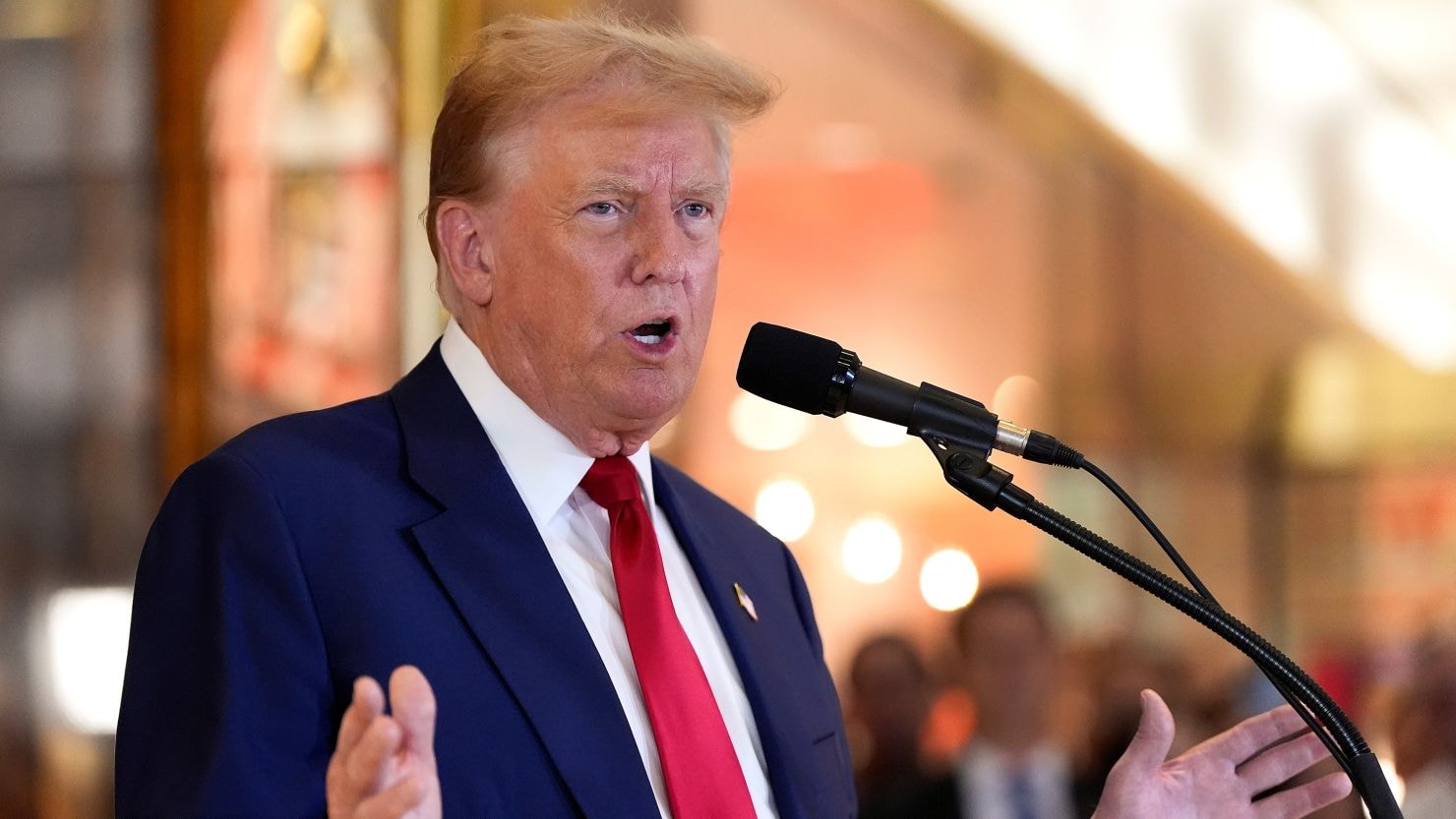
Nearly 600,000 people had signed up to attend the events, some of which took place in major cities like London and Paris, according to Indivisible, one of the organizations leading the movement in collaboration with a nationwide coalition that includes civil rights organizations, veterans, women’s rights groups, labor unions and LGBTQ+ advocates.
Organizers say they have three demands: “an end to the billionaire takeover and rampant corruption of the Trump administration; an end to slashing federal funds for Medicaid, Social Security, and other programs working people rely on; and an end to the attacks on immigrants, trans people, and other communities.”
CNN has reached out to the White House for a statement.
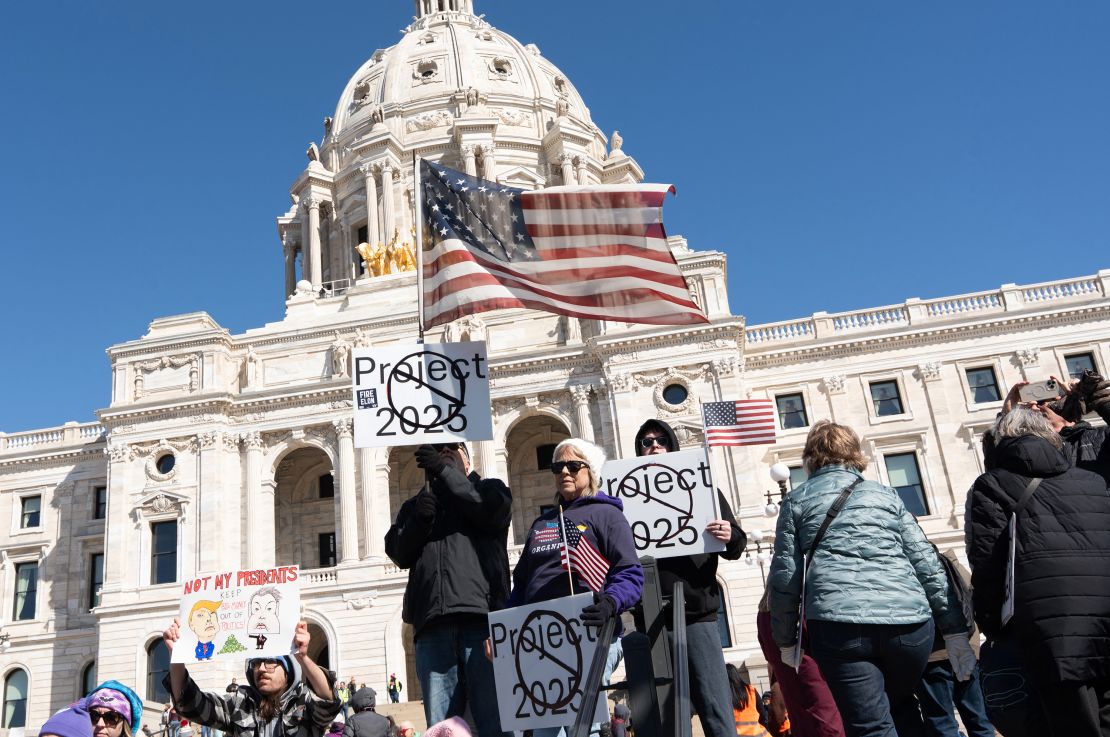
Tim Evans/AFP via Getty Images
State representatives speak at protests
During the Hands Off! protest in Washington, DC, multiple representatives took to the podium to speak about the Trump administration, including Democratic Rep. Jamie Raskin of Maryland, who said there is no future with a president who has “the politics of Mussolini and the economics of Herbert Hoover.”

“Our founders wrote a Constitution that does not begin with ‘We the dictators,’ the preamble says ‘We the people,’” Raskin said in front of a crowd of thousands gathered at the Washington Monument, holding signs condemning the administration. “No moral person wants an economy-crashing dictator who knows the price of everything and the value of nothing.”
Rallygoers traveled from across the country in a show of force at the nation’s capital over concerns of the administration’s policies. Demonstrators on the National Mall chanted, “Hey ho, Trump’s gotta go,” while holding signs reading “Protect our Constitution” and “Hands off our rights.”
“If you want a country that still believes in due process, we have to fight for it,” said Minnesota Democratic Rep. Ilhan Omar at the Washington protest. “If you believe in a country where we take care of our neighbors, look after the poor and make sure our children have a future they can believe in, we have to fight for it.”
Florida Rep. Maxwell Frost also spoke, urging people to take action by protesting, donating to mutual aid, participating in direction action and focusing on legislative strategies.
“Throughout human history, authoritarians, they’re never satisfied with the power they have, and so they test the bounds, they push the limits, they break the law, and then they look at the public to see if they’re quiet or if they’re loud,” said Frost

In Los Angeles, protesters marched along a 1-mile loop toward City Hall, chanting “Power to the People” and wielding signs with messages like “Hands Off Education” and “Resist, Resist.”
Since Trump took office, his administration has been vocal about its efforts to cut federal spending, regardless of who it may harm. Thousands of federal workers have been laid off or issued immediate termination notifications as part of Trump and Musk’s plan to downsize the federal government.
And Musk, the world’s richest man, has aggressively pushed policies to reduce spending as the head of the so-called Department of Government Efficiency, all while repeatedly misleading the public about federal spending.

He has also boasted that he put USAID — an agency that feeds some of the world’s poorest, most desperate people and has saved millions of lives — “in the wood chipper.”
They dismantled foreign aid programs that support fragile democracies abroad and put on leave federal workers who protect US elections at home in a move that current and former officials say abandons decades of American commitments to democracy.
The Social Security Administration, responsible for monthly benefits to around 73 million Americans, is now in turmoil after a massive reorganization, including cutting thousands of employees.

Trump and his team have also taken extraordinary measures to crack down on immigration, aggressively pressuring ICE to pick up the pace of migrant arrests and touting mass deportation plans despite the administration making multiple missteps in recent weeks, including mistakenly deporting a Salvadoran man.
“They tell us that immigrants are stealing our jobs, but they’re the ones shipping jobs overseas and hiring corporate lawyers to go and union bust,” said Frost.
“They tell us that trans people are a threat to our children, but they’re the ones dismantling public education. They’re the ones denying the climate crisis. They’re the ones poisoning our planet. They’re the ones doing nothing about the national public health emergency of gun violence,” Frost added.
The Trump administration has frequently questioned climate science and said it will roll back major climate policies, including rules that target pollution from vehicles and power plants, in a major blow to America’s progress on clean air, clean water and climate action. Trump has also ordered the federal government to re-evaluate its gun policies and all ongoing litigation that could restrict Americans’ gun rights.
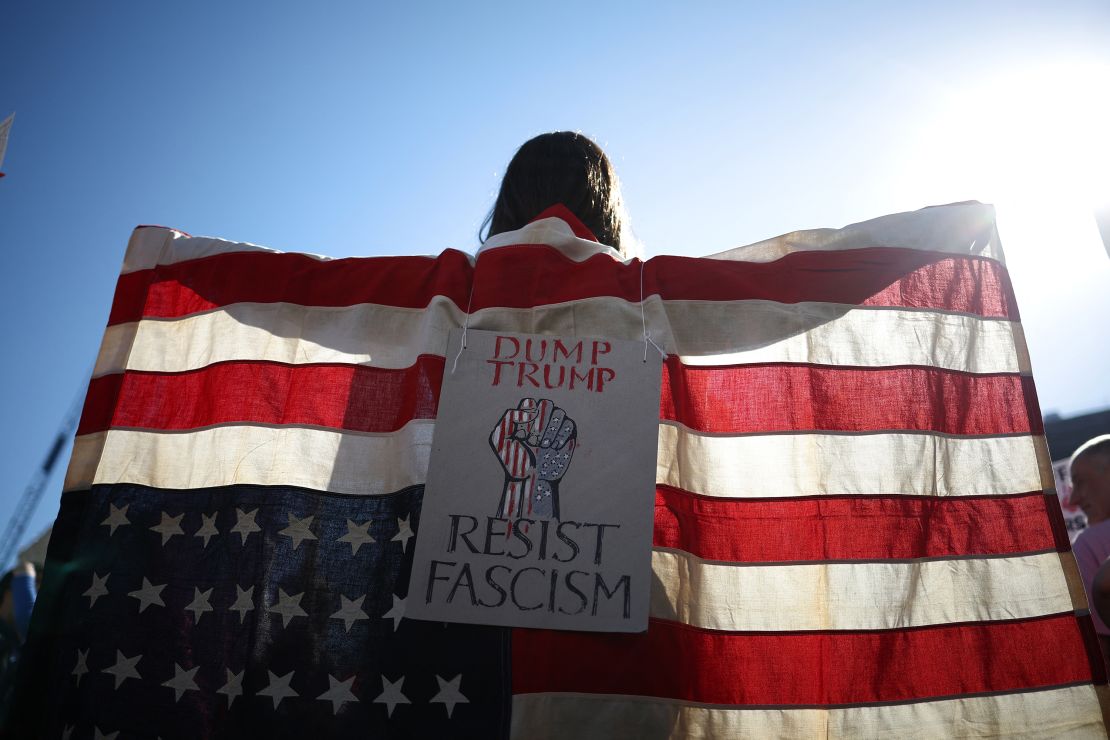
Henry Nicholls/AFP via Getty Images
Frost called the current state of politics in America an “insidious rise of authoritarianism” fueled by “corrupt billionaires and mega corporations” who think they have a right to control all aspects of the lives of their citizens, including freedom of speech.

The arrest of Mahmoud Khalil, a Palestinian refugee whose green card was revoked over his involvement in demonstrations at Columbia University, has raised chilling questions about whether people can truly exercise their constitutionally protected right to free speech.
“Our communities are paying the price while the Trumps and Musks of the world cash in. It’s not just about money – it’s about power,” Hands Off! organizers wrote. “This administration is targeting everybody who isn’t part of the 1% – veterans, kids, seniors, farmers, immigrants, transgender people, and political opponents. All to consolidate power and reward their allies.”
Although protests across the country were largely peaceful, in downtown Lafayette, Indiana, a man took a long gun out of his car and approached the crowd.
Lafayette Police say the man attempted to make a lawful turn at an intersection near the Tippecanoe County Courthouse but was blocked by protesters in the street. The man got out of his truck and, according to the police statement, was headbutted by a protester after tensions escalated between him and the crowd of demonstrators.
The man then returned to the truck and got a gun from his vehicle, which he later described as an act of self-defense, before placing it back in his truck, the statement reads.
Lafayette police officers detained the man after receiving reports that he had pointed the weapon at protesters. However, police said that after investigating the incident, they determined he had not aimed the firearm at anyone and released him.

Labor union presidents speak out
Two federal employee union presidents spoke out on Saturday against Trump and his policies targeting federal workers at the protest in DC.
“(The) Trump administration is absolutely destroying public services in this country. That’s right. They claim to be making government more efficient,” said National Federation of Federal Employees President Randy Erwin. “That is a joke, people. That is a cruel joke. They’re doing the exact opposite.”
NFFE and the American Federation of Government Employees are a part of a coalition of unions that filed a lawsuit in the US District Court in San Francisco this week seeking to stop the Trump administration from ending collective bargaining rights for many federal employees.

“They thought we were easy targets. But let me tell you something about union members and veterans. We will not be intimidated. I’m a veteran myself. I’m an Army veteran. We will not be silenced. We will not bow down. We’ll stand up and say hands off our union. We’ll stand up and say hands off our contract,” AFGE President Everett Kelley said.
Erwin called the move by the Trump administration “the biggest assault on collective bargaining that we have ever seen in this country.”
“AFGE has been in the courts, in the media, in Congress, and here with you on the street. And not only are we in the court, but we are kicking their behind while we’re in the court, and we’re going to continue to kick their behind,” Kelley said.
Since taking office, Trump has sought to reshape the federal workforce. In one of his earliest moves, he ended remote work for government employees and agencies were provided guidance on how they can override union collective bargaining agreements on telework and remote work.
At least 121,361 workers have been fired from federal agencies so far, as of CNN’s latest tally on March 28.
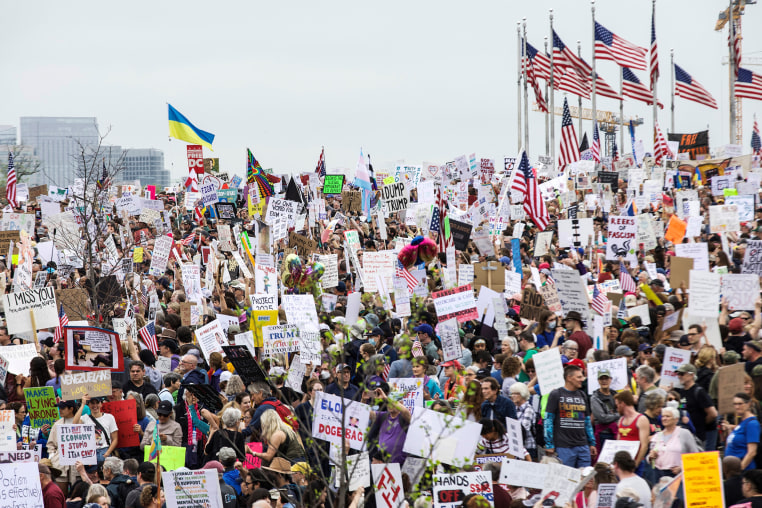
Everything is blowing up in Elon Musk’s face
All it took was losing $100 billion in three months to make Elon Musk change his tune on government work.
ICYMI: The last 24 hours have brought a parade of humiliation for the world’s richest edgelord, starting with his $20 millionlosing bet on the pro-Trump candidate for the Wisconsin Supreme Court. Hours after the loss in Wisconsin, Tesla reported its biggest sales drop ever,falling 13% in the first quarter, while its No. 1 rival grew revenue by 60% in the same time period. Then came a Politico report quoting MAGA insiders who say that Musk has overstayed his welcome in Washington.
The White House on Wednesday called the Politico report “garbage,” and Musk dismissed it as “fake news” in social media post. But the administration confirmed that Musk is expected to wrap up his stint as Trump’s hatchet man in late May or June, when his 130 days as a “special government employee” comes to an end. That was enough to reverse a 6% decline in Tesla shares — a sign investors are optimistic that Musk will ditch the cheese-hat shenanigans and focus on his company’s rapidly shrinking market share (and maybe, possibly, deliver on his long-delayed promises to revolutionize autonomous driving.)
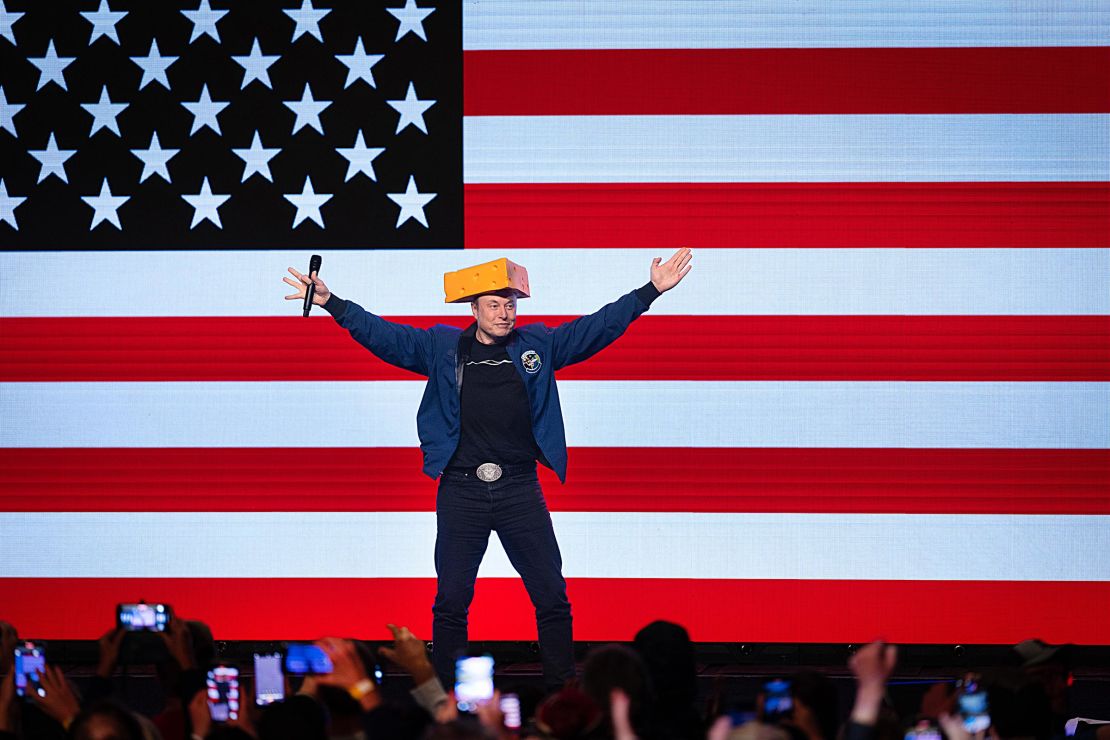
Scott Olson/Getty Images
In short: Voters, customers, investors and the MAGA elite say the Elon Musk show has lost the plot.
Musk has shed more than a quarter of his total net worth since January as Tesla shares have tanked. He remains the world’s richest person by a country mile with $323 billion — second-placer Jeff Bezos is still more than $100 billion behind.
Because Musk is both the public face of Tesla and its biggest individual shareholder, when one suffers, the other suffers in kind. Musk’s alliance with the far right has torched Tesla’s brand in the eyes of what used to be the carmaker’s base: upwardly mobile eco-conscious lefties from the coasts.
It was never clear how Musk planned to replace those customers with folks from red states who have long resisted EV adoption. So far, various attempts to stem the bleeding have only made things worse.
A live Tesla sales pitch with Trump on the South Lawn reeked of desperation. The Commerce secretary’s urging of regular Americans to buy Tesla shares, similarly, fell flat. And the FBI threatening to prosecute Tesla vandals as domestic terrorists — a wild re-imagination of the meaning of “terrorism,” according to legal experts — only reinforced the sense of desperation around the brand.
But the ultimate rebuke came from voters. Musk tried to use his virtually infinite money to influence the Wisconsin race, and even showed up in a giant cheese hat at a rally in Green Bay, during which he handed out two $1 million checks to voters in a stunt that faced an immediate legal challenge.
Hiseffort backfired, and the state court retained its 4-3 liberal majority.
Bottom line: Money can buy a lot of things, but not all things. And with Tesla’s continued sales drop, Musk is getting a harsh reminder that he’s not the only one who can wield a pocketbook to send a message.
Jaguar Land Rover pauses shipments to US as Trump says impact of tariffs ‘won’t be easy’ – as it happened
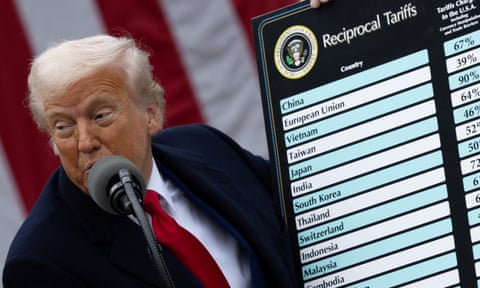
A summary of today’s developments
-
Donald Trump on Saturday doubled down on the sweeping tariffs he unleashed on countries around the world, warning Americans of pain ahead, but promising historic investment and prosperity. “We have been the dumb and helpless ‘whipping post’, but not any longer. We are bringing back jobs and businesses like never before,” Trump wrote on his Truth Social platform. “This is an economic revolution, and we will win,” he added. “Hang tough, it won’t be easy, but the end result will be historic.”
-
Trump’s 10% tariff on UK products came into force on Saturday, as global stock markets continued to fall in response to the imposition of import taxes. The FTSE 100 plummeted on Friday in its worst day of trading since the start of the Covid-19 pandemic, while markets on Wall Street also tumbled. Australia, Colombia, Argentina, Egypt and Saudi Arabia are among the countries also hit with the 10% tariff.
-
The initial 10% “baseline” tariff took effect at US seaports, airports and customs warehouses at 12.01am ET (0401 GMT). Many other countries will see their tariff rates increase above that next week – including the EU, which will be hit with a 20% rate. A 25% tariff imposed on all foreign cars imported into the US came into effect on Thursday.
-
Jaguar Land Rover (JLR) has confirmed it will “pause” shipments to the US in April as it works to “address the new trading terms” of Donald Trump’s tariffs.
-
Keir Starmer and Emmanuel Macron discussed their “concerns about the global economic and security impact, particularly in South East Asia” in the wake of Donald Trump’s tariffs, Starmer’s office said. In a post on X, Macron, said: “A trade war is in no one’s interest. We must stand united and resolute to protect our citizens and our businesses.”
-
Elon Musk said he hoped in future to see complete freedom of trade between the US and Europe. He spoke via video-link at a congress in Florence of Italy’s right-wing League party, which is part of the ruling coalition, Reuters reports. “At the end of the day, I hope it’s agreed that both Europe and the United States should move, ideally, in my view, to a zero tariff situation, effectively creating a free trade zone between Europe and North America,” said Musk.
-
Ralph Goodale, the high commissioner for Canada in the UK, told the BBC’s Radio 4 Today programme on Saturday that the “action taken by the US government is completely illogical”. He added: “It will damage the United States itself.”
-
The Italian economy minister, Giancarlo Giorgetti, warned on Saturday against the imposition of retaliatory tariffs on the US in response to Trump’s announcement of sweeping tariffs on trade partners. Speaking at a business forum near Milan, Giorgetti said Italy was aiming for a “de-escalation” with the US. “We should avoid launching a policy of counter-tariffs that could be damaging for everyone, and especially for us,” Giorgetti said.
-
The stock market plunge has more to do with the emergence this year of China’s DeepSeek artificial intelligence tool than with Trump’s policies, the US treasury secretary, Scott Bessent, said in an interview released on Friday that signalled little concern about the ongoing nosedive. “For everyone who thinks these market declines are all based on the president’s economic policies, I can tell you that this market decline started with the Chinese AI announcement of DeepSeek,” Bessent told former Fox News host Tucker Carlson.
-
Bangladesh’s interim leader called an emergency meeting on Saturday after textile leaders in the world’s second-largest garment manufacturing nation said US tariffs were a “massive blow” to the key industry. Trump on Wednesday slapped punishing new tariffs of 37 % on Bangladesh, increasing duties from the previous 16% on cotton and 32% on polyester products.
-
The Israeli prime minister, Benjamin Netanyahu, is expected to visit the White House on Monday to discuss recently announced tariffs with Trump, three Israeli officials said on Saturday. As part of a sweeping new tariff policy announced by Trump, unspecified Israeli goods exports to the US face a 17% tariff.
-
China has taken and will continue to take resolute measures to safeguard its sovereignty, security and development interests, its foreign ministry said on Saturday, citing a Chinese government stance on opposing US tariffs. The US should “stop using tariffs as a weapon to suppress China’s economy and trade, and stop undermining the legitimate development rights of the Chinese people”, the ministry said.
-
Nissan Motor is considering shifting some domestic production of US-bound vehicles to the US, the Nikkei reported on Saturday. As early as this summer, Nissan plans to reduce production at its Fukuoka factory in western Japan and shift some manufacturing of its Rogue SUV to the US to mitigate the impact of Trump’s tariffs, the business newspaper said, without citing the source of its information.
-
The president of Taiwan, Lai Ching-te, met tech executives on Saturday to discuss how to respond to new US tariffs, promising to ensure Taiwan’s global competitiveness and safeguard its interests. Lai met the executives at his official residence to discuss the response to “the global economic and trade challenges brought about by the reciprocal tariff policy”, his spokesperson, Karen Kuo, said in a statement. She did not say which companies were present, only that there were several representatives from the information and communications technologyindustry.
-
“Today, America is not only humiliating Iran, but also the world,” the Iranian president, Masoud Pezeshkian, said on Saturday, in an apparent reference to recent policies adopted by Trump, including imposing tariffs on imported goods. Pezeshkian said his country was willing to engage in dialogue with the US as equals, without clarifying whether Tehran would participate in direct talks.
-
China has said “the market has spoken” in rejecting Trump’s tariffs, and called on Washington for “equal-footed consultation” after global markets plunged in reaction to the trade levies that drew Chinese retaliation. Trump introduced additional 34% tariffs on Chinese goods as part of steep levies imposed on most US trade partners, bringing the total duties on China this year to 54%.

Why Trump May Get Away With His Tariff Trauma
Other countries encounter the ‘prisoner’s dilemma’ as they weigh how to respond.
As President Donald Trump announced historically high tariffs across the world this week, I expected a number of affected governments to rapidly and collectively fight back.
Instead, with the exception of China and a few scattered reprisals from allies, we’re seeing mainly cautious reactions. Foreign officials are talking about “calibrated” responses and keeping a “cool head.” Some are clearly hoping diplomacy will persuade Trump to back off some or many of his tariffs.
In conversations with diplomats, economists and former U.S. officials, I asked why. Weren’t they concerned this muddled, cautious global reaction would be too weak to persuade Trump to change course, or even embolden him to get tougher?

But these experts argued that there are compelling reasons many governments are not acting fast or in unison — not the least of which is that the world’s countries are not good at collective action, and many believe they have a better shot at accomplishing more, for themselves at least, if they avoid escalating the fight with Trump.
Besides, it’s not at all clear if any moves by other countries will deter Trump’s tariff mania.
Trump has been a proponent of tariffs for many years, a product of his long-held belief that America’s trade deficits mean that other countries are ripping off the United States, even if that’s not how trade deficits work. Countries had months to prepare for Trump’s tariffs, including devising their own menus of retaliatory actions.
But Trump, in his second term, seems to have a much bigger goal than he did in the past: a complete restructuring of the U.S. economy.

It appears to be a legacy issue for him, and, from what we’ve seen so far, he doesn’t care as much as he did before about stocks sliding. Trump has even said Americans should expect short-term discomfort, indicating there could be a recession, while also saying that in the long-term he will be proven to have done the right thing
The bottom line is that when it comes to Trump today, “We don’t know what the pain threshold is,” said Brian Gardner, chief Washington policy strategist for investment banking firm Stifel Financial. Whatever it is, it’s “significantly higher than people had previously estimated.”
The U.S. economy also is big and diverse, with the ability to absorb significant shocks — meaning the pain could take a while to feel.
But what if the infliction of pain comes from a coalition of countries — governments banding together to strategically hit the U.S. economy? Would that make Trump think twice?
It’s a nice theory, but not very realistic, I was told. Governments simply don’t easily come together to unite in action, even when they are faced with a common threat.
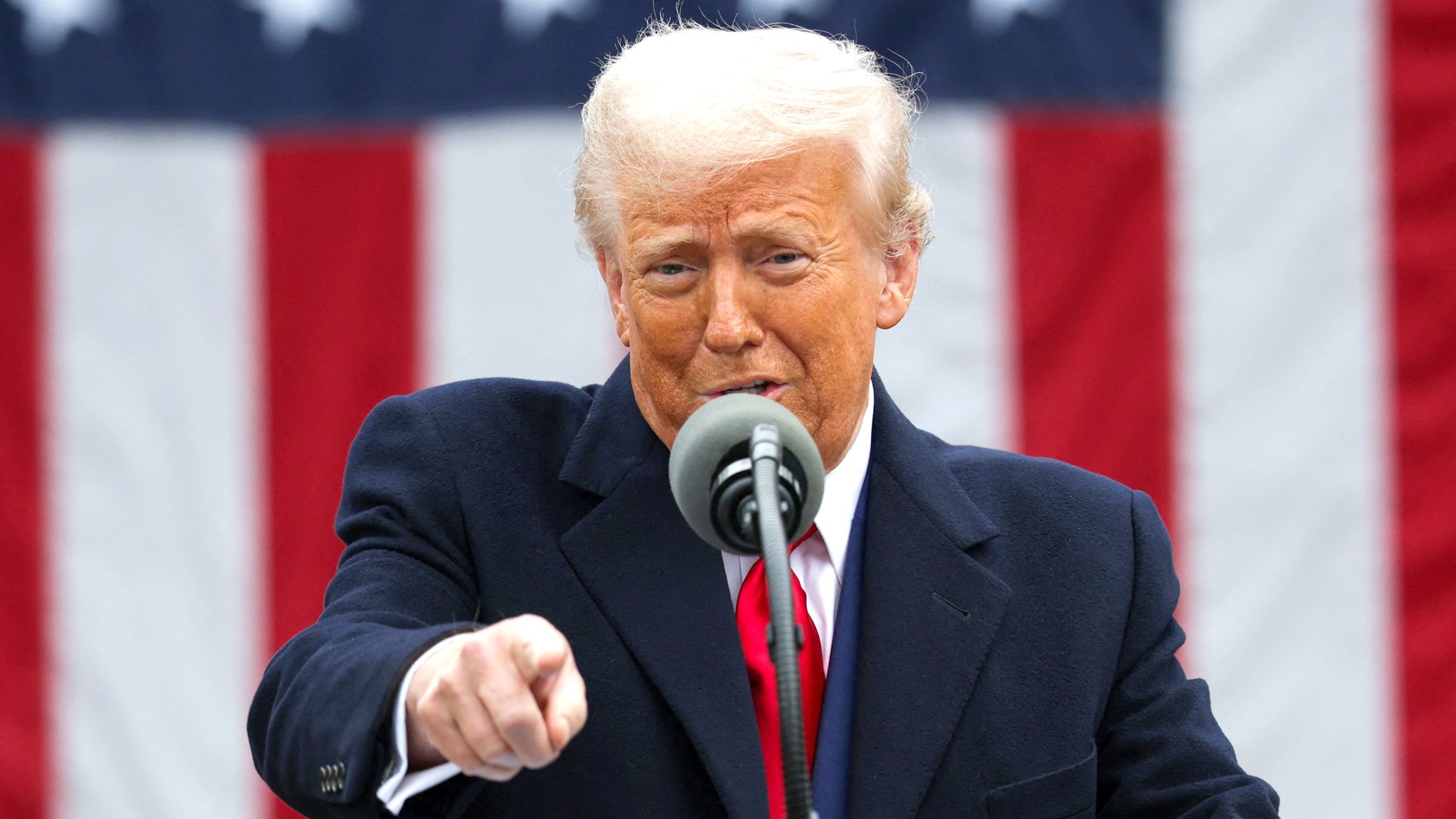
Each government has its own national interest and doesn’t trust others won’t stab them in the back, said one foreign diplomat, who likened it to the classic “prisoner’s dilemma.” Remember how little global solidarity there was during the early days of the Covid-19 pandemic as countries raced to secure medical supplies?
The European Union is a long-established exception on the trade front, obviously, and it is preparing at least two sets of retaliatory tariffs, though it’s spacing them out, reportedly in hopes of negotiations. But other groupings have yet to emerge to take on Trump’s tariffs.
There were reports that China may coordinate its tariff response with Japan and South Korea, but few people took the idea seriously given those three countries’ contentious histories with one another. (One economist told me they “giggled” at those headlines.) And on Friday, China retaliated unilaterally against the U.S. with 34 percent across-the-board tariffs.
Many countries are still trying to sift through the details of Trump’s announced tariffs, but they have come to accept that he is going to tariff the world somehow. So they’re also looking for ways to negotiate a better deal than others.
“I can’t be the last one to reach a deal with Trump, because if I’m the last one, then I’m the one who’s going to get screwed,” the foreign diplomat said. Like others, the diplomat was granted anonymity to be candid about a sensitive issue. “If I’m the first one to reach the deal, then it might be the most advantageous possible thing, and compared to other countries, I’ll be better off. And so my trade will suffer relatively less.”
One former Trump administration official told me the sense that he’s getting from some foreign officials is relief that the tariffs were milder than they’d expected even though they were still crazy high. (Having covered Trump for a decade, I’ve learned to accept that two contradictory things can be true at the same time.)
Kelley Robinson, president of the Human Rights Campaign, addressed a rally in Washington, criticising the government’s treatment of marginalised communities. “The attacks that we’re seeing, they’re not just political. They are personal, y’all,” she said, reported AFP.
Similar protests were held in Atlanta, Boston, Miami, and Charlotte, with crowds demanding action on immigration, healthcare and workers’ rights.

International protests
Around the world, American expatriates and local supporters assembled in cities including Berlin, Frankfurt, Paris, and London.
In Paris, approximately 200 demonstrators, predominantly Americans, gathered at Place de la Republique, displaying banners with messages like “Resist Tyrant,” “Rule of Law,” and “Feminists for Freedom not Fascism.”
Timothy Kautz, a spokesperson for Democrats Abroad, emphasised the importance of global solidarity. “We have to show solidarity with all the demonstrations in a thousand cities today in the USA,” he told Reuters.

Demonstrators march during the nationwide “Hands Off!” protest against US President Donald Trump and his advisor, Tesla CEO Elon Musk, in New York on April 5, 2025. [Charly Triballeau/AFP]
Ezra Levin, co-founder of Indivisible, one of the organising groups, speaking to Reuters said, “This is an enormous demonstration that is sending a very clear message to Musk and Trump and congressional Republicans and all the goose-stepping allies of MAGA that we don’t want their hands on our democracy, on our communities, on our schools and our friends and our neighbours.”
The White House has defended the administration’s actions.
Assistant press secretary Liz Huston stated, “President Trump’s position is clear: He will always protect Social Security, Medicare, and Medicaid for eligible beneficiaries. Meanwhile, the Democrats’ stance is giving Social Security, Medicaid, and Medicare benefits to illegal aliens, which will bankrupt these programs and crush American seniors.”
Pro-Palestinian groups also participated in the Washington demonstrations, protesting against the US administration’s support for Israel’s renewed military actions in Gaza and the crackdown on campus protests.
































:max_bytes(150000):strip_icc():format(webp)/Alyssa-Milano-Shannen-Doherty-020324-5824006d8aaf4913a01454b3bc0c0def.jpg?w=1200&resize=1200,0&ssl=1)

